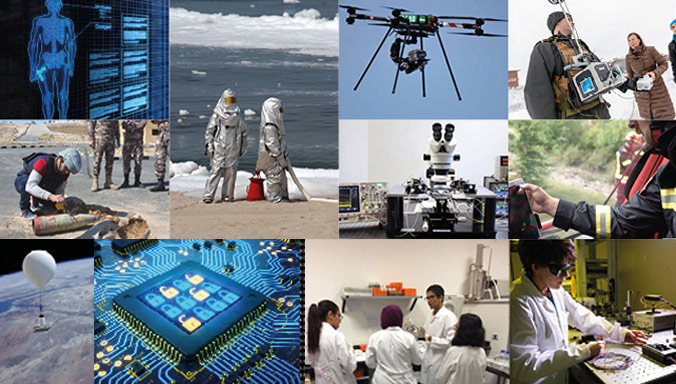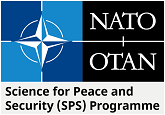NATO SPS Information Day 2024
The Science for Peace and Security (SPS) Programme promotes dialogue and practical cooperation between NATO member states and partner countries based on scientific research, technological innovation and knowledge exchange. The SPS Programme offers funding, expert advice and support to tailor-made, civil security-relevant activities that respond to NATO’s strategic objectives.

The SPS Programme enhances practical, result-oriented cooperation involving scientists, experts and government officials from NATO member and partner countries alike.
It responds and adapts to the changing security environment to support NATO’s strategic objectives and political priorities in its relations with partner countries.
The SPS Programme makes contributions to NATO’s efforts to project stability and build capacity in partner countries.
SPS activities are guided by security-related priorities such as counter-terrorism, cyber defence, advanced technologies, energy and environmental security, and threats posed by chemical, biological, radiological, nuclear and explosive (CBRNE) hazards.
Over the past five years, the Programme has initiated more than 200 collaborative activities among NATO member states and partner countries
Introduction to the SPS Programme
The SPS Programme promotes civil security-related practical cooperation based on scientific research, innovation and knowledge exchange. It links the scientific community to NATO through civil science cooperation that addresses emerging security challenges. Through SPS activities, civilians – including researchers, academics and experts – play an important role in helping the Alliance identify, understand and respond to vulnerabilities and threats.
The SPS Programme offers unique ways to engage networks of scientists, experts and government officials from NATO member and partner countries in meaningful, practical cooperation with tangible results and deliverables contributing to technical and scientific advancement. These networks develop and implement collaborative SPS activities tackling challenges such as cyber defence, counter-terrorism, energy and environmental security, and defence against CBRNE agents. Initiatives include developing security-related advanced technologies in fields such as quantum, sensing and detection, artificial intelligence and autonomy, and also address human and social aspects of security such as the implementation of United Nations Security Council Resolution (UNSCR) 1325 on Women, Peace and Security.
The SPS Programme provides the Alliance with a channel for non-military communication among scientists and other experts, including in situations or regions where other forms of dialogue are difficult to establish. It enables NATO to become actively involved in such regions, often serving as the first concrete link between NATO and new partners.
The SPS Programme has evolved continuously since its foundation in 1958. A comprehensive reorientation of the Programme took place in 2013, which gave SPS a renewed focus on larger-scale strategic activities beyond purely scientific cooperation.
SPS grant mechanisms
The SPS Programme supports scientific cooperation through established grant mechanisms that provide funding for multi-year projects and events. Supported events include advanced research workshops (ARWs), advanced study institutes (ASIs) and advanced training courses (ATCs). All SPS-funded activities fit within one of these formats.
The Programme supports both ‘top-down’ and ‘bottom-up’ activities. While the former are initiated by NATO International Staff in cooperation with Allies and/or partner countries, the latter are submitted directly to the SPS Programme by independent scientists and experts themselves in response to calls for proposals advertised on the SPS website.
To be eligible for SPS support, any application must be developed jointly by project directors from at least one NATO member country and one partner country. Applications must also directly address at least one of the SPS key priorities and have a clear link to security. Each application received by the SPS Programme undergoes a comprehensive, multi-phase evaluation and peer review process that takes into account expert, scientific and political guidance.
This process ensures that all SPS applications approved for funding have been thoroughly evaluated for their scientific merit and security impact by NATO experts, independent scientists and NATO member countries in the Partnerships and Cooperative Security Committee (PCSC).
Highlights of SPS activities
SPS flagship initiatives support NATO’s strategic objectives and contribute to several of NATO’s key partnership initiatives. In particular, SPS activities are an integral component of NATO’s efforts to project stability and strengthen security also beyond the Alliance, and are aligned with guidance and priorities outlined during NATO summits and ministerial meetings.
Below are selected highlights of the SPS Programme’s flagship activities.
In response to terrorist threats, the SPS Programme is supporting the DEXTER (Detection of EXplosives and firearms to counter TERrorism) Consortium. DEXTER is a multinational ‘top-down’ initiative run by 11 laboratories and research institutes from NATO member countries (Finland, France, Italy, Germany, the Netherlands) and partner countries (Ukraine, the Republic of Korea and Serbia). Launched in 2019, it aims to develop an integrated and affordable sensor-fusion system able to detect explosives and firearms in public places, remotely and in real time. As an alternative to random searches on moving pedestrians or crowd management through multiple checkpoints, DEXTER’s final product will allow the identification of carriers of firearms and explosives without affecting passengers’ traffic in mass transit scenarios, such as subway stations, train stations and airports, as well as mass gathering venues. A one-month trial demonstrating the application of the three integrated DEXTER technologies was successfully completed in a subway station in Rome, Italy in May 2022.
Through its innovative activities in the field of security-related advanced technology, the SPS Programme is aligned with NATO’s efforts to maintain its technological edge. In particular, the Programme is supporting research and development projects as well as knowledge-sharing in fields relevant to the ongoing discussions on emerging and disruptive technologies, such as quantum technologies, autonomy, artificial intelligence and machine learning, as well as bio-engineering and human enhancement. Moreover, SPS activities engage researchers from NATO member and partner countries in activities investigating topics such as data science, communication systems, sensing and detection, advanced materials and technological convergence.
In the field of cyber defence, SPS activities are enhancing cyber defence awareness, capacity-building, as well as research and development. Between 2018 and 2021, the SPS Programme sponsored tailored advanced training courses on cyber defence for over 440 cyber defence experts in partner countries such as Azerbaijan, Jordan and Tunisia, as well as in North Macedonia in preparation for its accession to NATO. In 2020, the Programme completed two multi-year projects on capacity-building in Mongolia and the Republic of Moldova. These two initiatives provided equipment, training and technical advice for the establishment of Cyber Incident Response Capabilities (CIRC) in their armed forces. Moreover, SPS-supported cyber defence research and development projects are bringing together experts from NATO and partner countries to investigate subjects such as quantum computing, cyber security technology and the security of cyber-physical systems.
In the field of crisis management, the SPS Programme and the US Department of Homeland Security, Science & Technology Department supported the multi-year regional initiative called “Next-Generation Incident Command System (NICS)” in the Western Balkans. This flagship project has developed and implemented a system to facilitate coordination among first responders during natural disasters and other incidents, and improved civil emergency management across the Western Balkans. Moreover, the Programme is contributing to the enhancement of Mauritania’s crisis management system with the top-down initiative PROMEDEUS. This multi-year project, launched in July 2020, builds on the achievements of two previous SPS efforts that established a crisis management centre in the capital Nouakchott and four regional operational coordination centres. PROMEDEUS aims to upgrade Mauritania’s operational and emergencies management capabilities in the fields of public health and civil protection, notably through the creation of a telemedicine system for medical emergencies.
The SPS Programme’s broad network of experts, scientists and research institutions help tackle the security implications of the COVID-19 pandemic from different perspectives and contribute to NATO’s response to the coronavirus pandemic. For instance, in May 2020, the SPS Programme launched a new scientific project aiming to develop tools for the rapid and large-scale diagnosis of COVID-19. Research laboratories in Italian and Swiss universities and the Italian National Institute of Health (ISS) are leading this initiative, combining expertise from the fields of immunology, virology and molecular biology to develop a new generation of rapid, accurate and sensitive immuno-diagnostic methods.
The SPS Programme has supported NATO’s Defence and Related Security Capacity Building (DCB) Initiative through flagship projects, training courses and workshops. The Programme has responded to requirements outlined by authorities in Iraq, Jordan and the Republic of Moldova, and successfully completed tailored activities in the fields of countering improvised explosive devices (C-IED), cyber defence, border security, and the Women, Peace and Security agenda. The SPS Programme is currently contributing to the DCB package for Tunisia, where it has already enhanced the cyber defence competencies of employees in key governmental institutions through two advanced training courses. In the field of chemical, biological, radiological and nuclear (CBRN) defence, the Programme is strengthening Tunisia’s ability to respond to the threat of chemical agents by developing and deploying a dual-use mobile chemical laboratory.
Since 2014, in response to the crisis in Ukraine, cooperation in the field of security-related civil science and technology has been strengthened and Ukraine has since become the largest beneficiary of the SPS Programme. The NATO-Ukraine Joint Working Group on Scientific and Environmental Cooperation contributes to identifying priority areas for practical scientific cooperation in the framework of the SPS Programme.
Since the establishment of the NATO-Istanbul Cooperation Initiative (ICI) Regional Centre in Kuwait in 2017, the SPS Programme has delivered 11 tailor-made advanced training courses at the Centre. These courses provided essential competencies in the fields of critical energy infrastructure protection, cyber defence and response to CBRN incidents to groups of experts and officials from partner countries in the framework of the Istanbul Cooperation Initiative, as well as Gulf Cooperation Council countries.
The data in this section, including the graphics, are taken from the Science for Peace and Security Programme's website.
